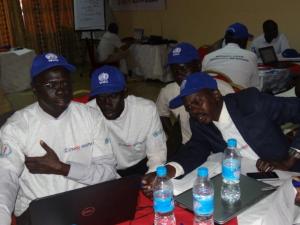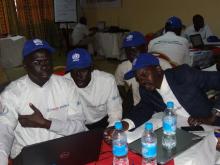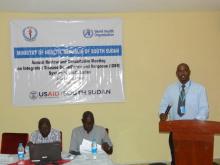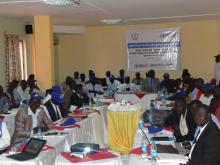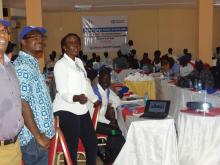WHO partners with South Sudan’s Government to strengthen disease surveillance and outbreak response to save lives
03 February 2017, Juba, South Sudan – The deteriorating security situation in South Sudan, along with disruption of health services, increased population displacement, overcrowding and poor environmental conditions, led to more frequent disease outbreaks.
With more disease outbreaks, levels of illness, disability and death are rising significantly in South Sudan. Given South Sudan’s increased vulnerability to disease outbreaks, strengthening national disease surveillance, response and control systems is crucial for early detection and rapid containment of major disease outbreaks to help reduce needless illnesses and deaths.
To improve reporting performance and capacity to detect outbreaks, WHO collaborated with the Ministry of Health (MoH) and partners to review South Sudan’s Integrated Disease Surveillance and Response (IDSR) system from 2 to 3 February 2017 in Juba. The MoH, along with WHO, the state MoH directors general and state surveillance officers, reviewed the IDSR’s progress and achievements in 2016, with the aim of developing tailored strategies to improve program performance in 2017.
Dr Allan Mpairwe, WHO Health Security and Emergency Officer, commended the MoH’s commitment to prioritize the implementation and strengthening of disease surveillance by adopting and implementing the IDSR strategy at all levels. He added that reporting performance is a major indicator of the system’s sensitivity to detect public health threats and should be prioritized in 2017.
With support from WHO and funding from the United States Agency for International Development (USAID), the MoH continued making progress towards building a robust national disease surveillance system. In 2015 and 2016, the IDSR system helped in identifying, investigating and responding to 49 alerts, including outbreaks of cholera, measles, viral hemorrhagic fever, malaria and hepatitis E virus from multiple locations.
Dr Atem Nathan Riek, the acting MoH Director General for Preventive Health Services, expressed gratitude to USAID and WHO for their commitment in supporting disease surveillance and response in South Sudan, and urged attending surveillance officers to adhere to the IDSR strategy to attain the optimal weekly reporting rate of 80%.
The high burden of diseases in sub-Saharan African countries like South Sudan demands timely response interventions that include implementing efficient, flexible and comprehensive systems that integrate technical staff, resources, and information systems for effective infectious disease surveillance and response, said Dr Abdulmumini Usman, WHO Representative to South Sudan.
“The USAID-supported IDSR system in South Sudan has been instrumental in identifying and responding to disease outbreaks,” Dr Usman said. “The early detection of these outbreaks has helped to target interventions to prevent excess morbidity and mortality.”
At the end of the review, state surveillance officers committed to double efforts towards enhancing capacities for disease surveillance and response through regular support to health facilities with priority given to hospitals and Primary Health Care Centers to submit their weekly reports on time. Surveillance officers also committed to conducting trainings targeted at reinforcing capacities for case detection and reporting, data analysis, outbreak investigation and response, weekly submission of outbreak event logs, and conducting regular supportive supervision to all levels.
In addition, IDSR will be extended to the communities using a phased approach working in pilot counties prior to a countrywide rollout. In the same way, the meeting resolved to embrace mobile reporting to improve timeliness and completeness of reporting.
WHO committed to continue supporting the MoH to build an effective national disease surveillance system using the IDSR strategy.
____________________________________________
For more information please contact:
Dr Allan Mpairwe, +211 955 372 370, mpairwea [at] who.int (mpairwea[at]who[dot]int)
Dr Wamala Joseph Francis, +211955036445, wamalaj [at] who.int (wamalaj[at]who[dot]int)
Ms Jemila M. Ebrahim, +211950450007, ebrahimj [at] who.int (ebrahimj[at]who[dot]int)
Below:
01 Group discussion on the 2017 key planned activities
02 Dr Allan Mpairwe making an opening remark
03 Cross section of the participants
04 The facilitators wrapping up the meeting



